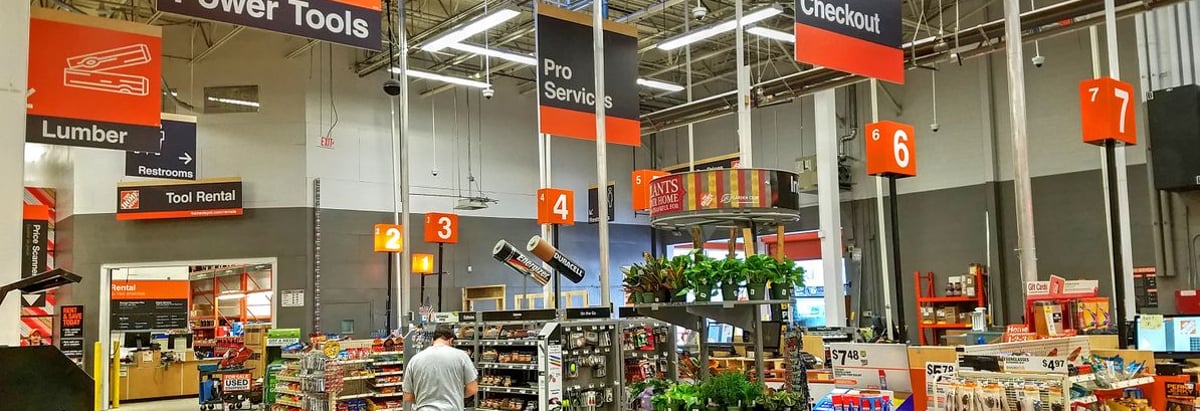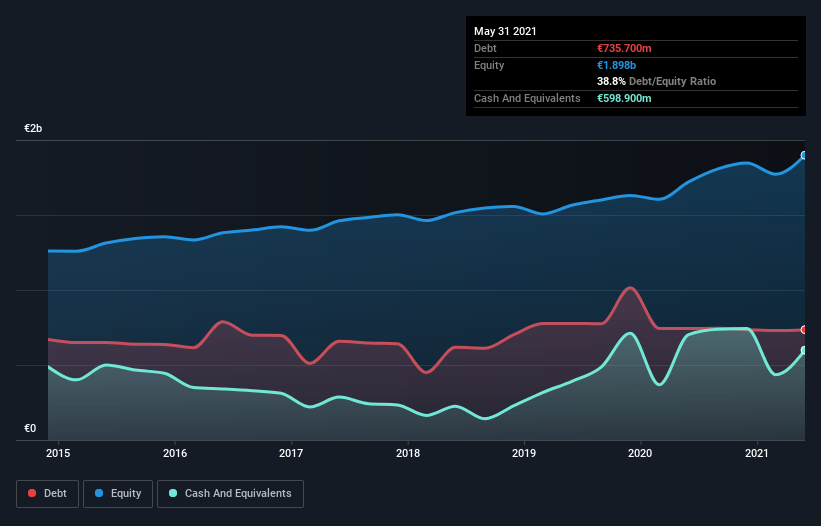
The external fund manager backed by Berkshire Hathaway's Charlie Munger, Li Lu, makes no bones about it when he says 'The biggest investment risk is not the volatility of prices, but whether you will suffer a permanent loss of capital.' When we think about how risky a company is, we always like to look at its use of debt, since debt overload can lead to ruin. Importantly, HORNBACH Holding AG & Co. KGaA (ETR:HBH) does carry debt. But is this debt a concern to shareholders?
When Is Debt A Problem?
Debt assists a business until the business has trouble paying it off, either with new capital or with free cash flow. Ultimately, if the company can't fulfill its legal obligations to repay debt, shareholders could walk away with nothing. However, a more usual (but still expensive) situation is where a company must dilute shareholders at a cheap share price simply to get debt under control. Of course, the upside of debt is that it often represents cheap capital, especially when it replaces dilution in a company with the ability to reinvest at high rates of return. The first step when considering a company's debt levels is to consider its cash and debt together.
See our latest analysis for HORNBACH Holding KGaA
What Is HORNBACH Holding KGaA's Debt?
The chart below, which you can click on for greater detail, shows that HORNBACH Holding KGaA had €735.7m in debt in May 2021; about the same as the year before. However, because it has a cash reserve of €598.9m, its net debt is less, at about €136.8m.

How Strong Is HORNBACH Holding KGaA's Balance Sheet?
The latest balance sheet data shows that HORNBACH Holding KGaA had liabilities of €914.4m due within a year, and liabilities of €1.40b falling due after that. Offsetting this, it had €598.9m in cash and €66.7m in receivables that were due within 12 months. So it has liabilities totalling €1.65b more than its cash and near-term receivables, combined.
This deficit is considerable relative to its market capitalization of €1.75b, so it does suggest shareholders should keep an eye on HORNBACH Holding KGaA's use of debt. This suggests shareholders would be heavily diluted if the company needed to shore up its balance sheet in a hurry.
We measure a company's debt load relative to its earnings power by looking at its net debt divided by its earnings before interest, tax, depreciation, and amortization (EBITDA) and by calculating how easily its earnings before interest and tax (EBIT) cover its interest expense (interest cover). This way, we consider both the absolute quantum of the debt, as well as the interest rates paid on it.
With net debt sitting at just 0.33 times EBITDA, HORNBACH Holding KGaA is arguably pretty conservatively geared. And it boasts interest cover of 7.2 times, which is more than adequate. Fortunately, HORNBACH Holding KGaA grew its EBIT by 5.6% in the last year, making that debt load look even more manageable. When analysing debt levels, the balance sheet is the obvious place to start. But it is future earnings, more than anything, that will determine HORNBACH Holding KGaA's ability to maintain a healthy balance sheet going forward. So if you're focused on the future you can check out this free report showing analyst profit forecasts.
Finally, while the tax-man may adore accounting profits, lenders only accept cold hard cash. So we always check how much of that EBIT is translated into free cash flow. In the last three years, HORNBACH Holding KGaA's free cash flow amounted to 47% of its EBIT, less than we'd expect. That weak cash conversion makes it more difficult to handle indebtedness.
Our View
Neither HORNBACH Holding KGaA's ability to handle its total liabilities nor its conversion of EBIT to free cash flow gave us confidence in its ability to take on more debt. But its net debt to EBITDA tells a very different story, and suggests some resilience. Looking at all the angles mentioned above, it does seem to us that HORNBACH Holding KGaA is a somewhat risky investment as a result of its debt. That's not necessarily a bad thing, since leverage can boost returns on equity, but it is something to be aware of. There's no doubt that we learn most about debt from the balance sheet. However, not all investment risk resides within the balance sheet - far from it. Case in point: We've spotted 1 warning sign for HORNBACH Holding KGaA you should be aware of.
If, after all that, you're more interested in a fast growing company with a rock-solid balance sheet, then check out our list of net cash growth stocks without delay.
If you’re looking to trade HORNBACH Holding KGaA, open an account with the lowest-cost* platform trusted by professionals, Interactive Brokers. Their clients from over 200 countries and territories trade stocks, options, futures, forex, bonds and funds worldwide from a single integrated account. Promoted
Valuation is complex, but we're here to simplify it.
Discover if HORNBACH Holding KGaA might be undervalued or overvalued with our detailed analysis, featuring fair value estimates, potential risks, dividends, insider trades, and its financial condition.
Access Free AnalysisThis article by Simply Wall St is general in nature. We provide commentary based on historical data and analyst forecasts only using an unbiased methodology and our articles are not intended to be financial advice. It does not constitute a recommendation to buy or sell any stock, and does not take account of your objectives, or your financial situation. We aim to bring you long-term focused analysis driven by fundamental data. Note that our analysis may not factor in the latest price-sensitive company announcements or qualitative material. Simply Wall St has no position in any stocks mentioned.
*Interactive Brokers Rated Lowest Cost Broker by StockBrokers.com Annual Online Review 2020
Have feedback on this article? Concerned about the content? Get in touch with us directly. Alternatively, email editorial-team (at) simplywallst.com.
About XTRA:HBH
HORNBACH Holding KGaA
Through its subsidiaries, develops and operates do-it-yourself (DIY) megastores with garden centers in Germany and other European countries.
Flawless balance sheet with proven track record.
Similar Companies
Market Insights
Community Narratives



